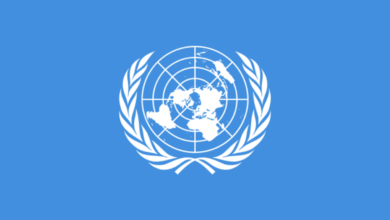Trump says looks like Iran was behind Saudi oil attacks
[su_label type=”info”]SMA News –Reuters[/su_label][su_spacer size=”10″] [su_dropcap]U.S[/su_dropcap]
U.S. President Donald Trump on Monday said it looked like Iran was behind attacks on oil plants in Saudi Arabia at the weekend that raised fears of a fresh Middle East conflict, but added that he did not want war with anyone.
Iran has rejected U.S. charges it was to blame for the attacks which damaged the world’s biggest crude processing plant in Saudi Arabia and triggered the largest jump in crude prices in decades.
Several U.S. cabinet officials, including Secretary of State Mike Pompeo and U.S. Secretary of Energy Rick Perry, have blamed Tehran for the strikes.
Iranian President Hassan Rouhani saying the strikes were carried out by “Yemeni people” retaliating for attacks by a Saudi-led military coalition in a war with Yemen’s Houthi movement.
Asked by a reporter in the White House if Iran was behind the attacks, Trump said: “It’s certainly looking that way at this moment and we’ll let you know. As soon as we find out definitively we’ll let you know but it does look that way.”
The attacks cut 5% of world crude oil production.
Two sources briefed on state oil company Saudi Aramco’s operations told Reuters it might take months for Saudi oil production to return to normal. Earlier estimates had suggested it could take weeks.
Tension in the oil-producing Gulf region has dramatically escalated this year after Trump imposed severe U.S. sanctions on Iran aimed at halting its oil exports altogether.
The U.S. leader said he did not want to act hastily.
“We have a lot of options but I’m not looking at options right now we want to find definitively who did this. We’re dealing with Saudi Arabia. We’re dealing with the crown prince and other of your neighbors. And we’re all talking about it together. We’ll see what happens,” he said.
“I’m somebody that would like not to have war,” Trump said. “No, I don’t want war with anybody but we’re prepared more than anybody.”
Oil prices surged by as much as 19% after the incidents but later came off their peaks. The intraday jump was the biggest since the 1990-91 Gulf crisis over Iraq’s invasion of Kuwait.
The market eased from its peak after Trump announced that he would release U.S. emergency supplies and producers said there were enough stocks stored up worldwide to make up for the shortfall. Prices were around 12% higher by afternoon in the United States.
SAUDI SUSPICIONS
Saudi Arabia said the attacks were carried out with Iranian weapons, adding that it was capable of responding forcefully and urging U.N. experts to help investigate the raid.
In remarks reflecting Saudi suspicions that Tehran was responsible, de facto ruler Crown Prince Mohammed bin Salman said Iranian threats were not only directed against the kingdom but against the Middle East and the world.
While the prince did not directly accuse Tehran, a foreign ministry statement reported him as calling on the international community to condemn whoever was behind the strike.
“The kingdom is capable of defending its land and people and responding forcefully to those attacks,” the statement added.
Rouhani said the strike was carried out by “Yemeni people.”
“Yemeni people are exercising their legitimate right of defense,” Rouhani told a joint news conference with his Russian and Turkish counterparts at a meeting in Ankara.
U.N. Yemen envoy Martin Griffiths told the Security Council on Monday it was “not entirely clear” who was behind the strike but he said it had increased the chances of a regional conflict.
But U.S. Ambassador to the world body, Kelly Craft, told the Council that emerging information on the attacks “indicates that responsibility lies with Iran” and that there is no evidence the attack came from Yemen.
Iran rejected U.S. accusations that it was responsible. “These allegations are condemned as unacceptable and entirely baseless,” Foreign Ministry spokesman Abbas Mousavi said in remarks carried by state TV.
The kingdom said it would be able to meet oil customers’ demand from its ample storage, although some deliveries had been disrupted. At least 11 supertankers were waiting to load oil cargoes from Saudi ports, ship tracking data showed on Monday.
Traders spoke of a long-term price rise as markets absorb the proof that global supply can hit so hard in a single strike.
“LOCKED AND LOADED”
Trump said on Sunday that the United States was “locked and loaded” to respond to the incident.
U.S. Energy Secretary Perry pinned the blame squarely on Iran for “an attack on the global economy and the global energy market”. Slideshow (11 Images)
“The United States wholeheartedly condemns Iran’s attack on Saudi Arabia and we call on other nations to do the same,” he told the U.N. nuclear watchdog IAEA. He added he was confident the oil market “is resilient and will respond positively”.
Iran’s Yemeni allies have promised more strikes to come. Houthi military spokesman Yahya Sarea said the group carried out Saturday’s pre-dawn attack with drones, including some powered by jet engines.
“We assure the Saudi regime that our long arm can reach any place we choose and at the time of our choosing,” Sarea tweeted. “We warn companies and foreigners against being near the plants that we struck because they are still in our sights.”
U.S. officials say they believe that the attacks came from the opposite direction, possibly from Iran itself rather than Yemen, and may have involved cruise missiles. Wherever the attacks were launched, however, they believe Iran is to blame.
Saudi Arabia and Iran have been enemies for decades and are fighting a number of proxy wars, including in Yemen where Saudi forces have been fighting against the Houthis for four years.
THREATS
The attacks have raised questions about how the kingdom, one of the world’s top spenders on weaponry, much of it supplied by U.S. companies, was unable to protect oil plants from attack.
Appearing to sense a commercial opening, President Vladimir Putin said Russia was ready to help Saudi Arabia by providing Russian-made air defense systems, which he said would protect any Saudi infrastructure.
For months, Iranian officials have issued veiled threats, saying that if Tehran is blocked from exporting oil, other countries will not be able to do so either. However, Iran has denied a role in specific attacks, including bombings of tankers in the Gulf and previous strikes claimed by the Houthis.
Russia and China said it was wrong to jump to conclusions about who was to blame for the attack on Saudi Arabia.
Washington has imposed its “maximum pressure” strategy on Iran since last year when Trump quit an international deal that gave Tehran access to world trade in return for nuclear curbs.
U.S. allies in Europe oppose Trump’s strategy, arguing that it provides no clear mechanism to defuse tensions, creating a risk that the foes could stumble into war.
Trump has said his goal is to force Iran to negotiate a tougher agreement and has left open the possibility of talks with Rouhani at an upcoming U.N. meeting. Iran says there can be no talks until Washington lifts sanctions.
Writing by William Maclean and Mike Collett-White; Editing by Alistair Bell






